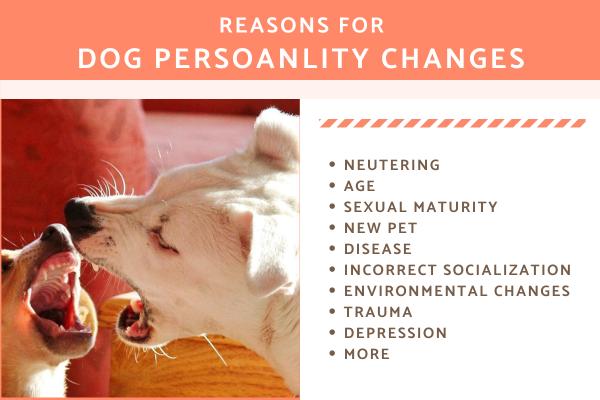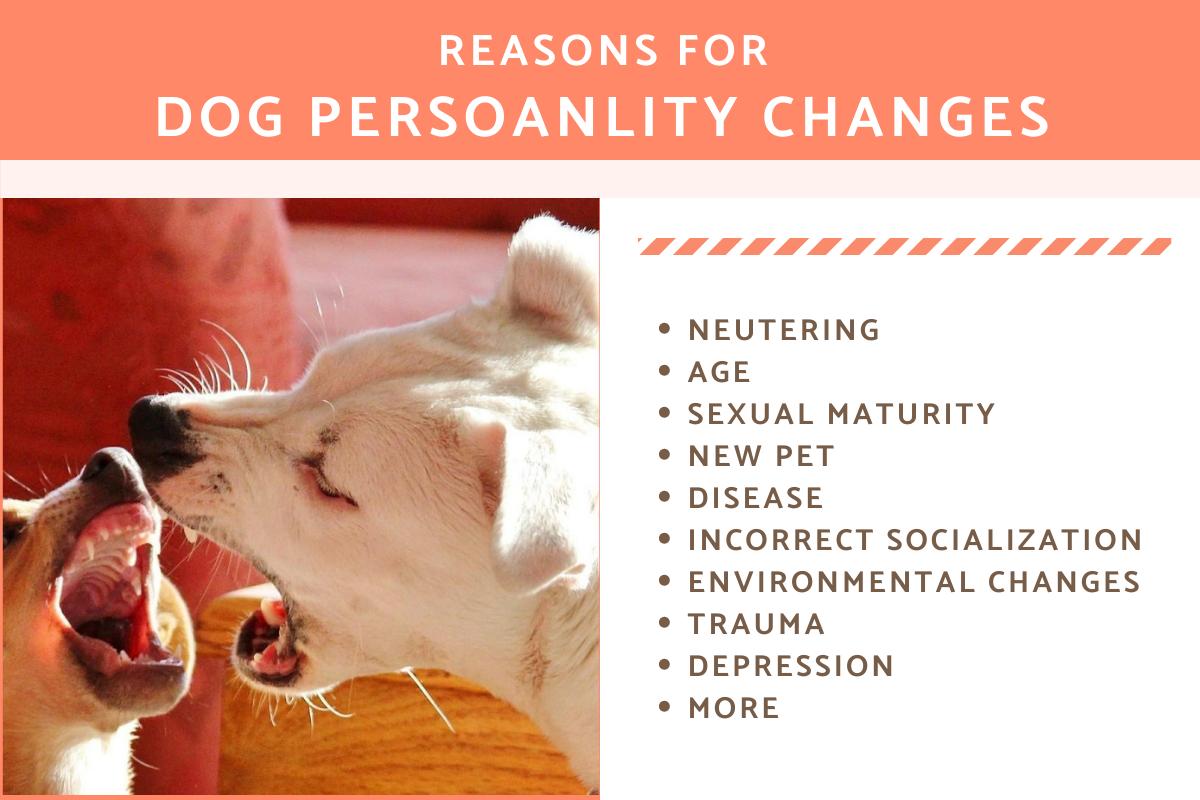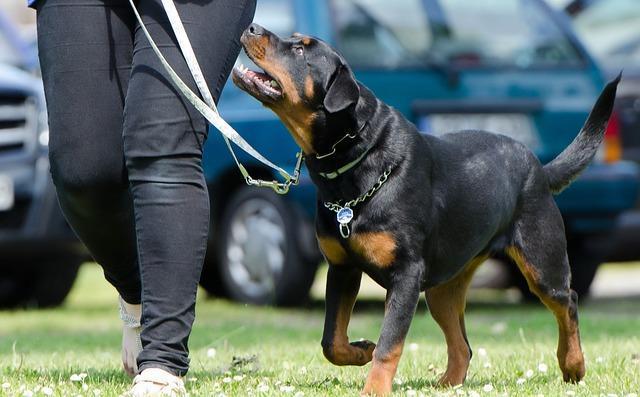Why Has my Dog's Personality Changed?



See files for Dogs
You will see a dog personality change due to alterations in their behavior. These changes can be brought on by physiological, psychological or environmental factors, but even the passage of time will affect our dog's personality to varying degrees. While we may be concerned if our dog's personality becomes more erratic or even aggressive, it is important to note that dogs can develop more positive behavioral changes. Although changes in a dog's personality are common, it is important we understand why as some can threaten their wellbeing.
At AnimalWised, we ask why has my dog's personality changed? We look at the reasons a dog's behavior has altered, how we can better interpret their emotions and what to do if there is a problem.
Getting to know a dog's personality
One of the most important elements of dog care is getting to know their personality. Too many of us project what we think a dog should be like or how they should behave. This is often associated with humanizing a dog, something which is counterproductive in ensuring their wellbeing. It is important to recognize how they communicate so that we can both understand their personality and recognize when it changes.
There are many factors which will influence a dog's personality. While breed is a significant influence, it is only one of many. More important is their experience, their socialization and their wellbeing. There are also unknown factors which will influence how a dog behaves, but our influence is very important when it comes to having a positive personality. We start by providing their basic needs, but getting to know our dog is a process without end.
We also need to learn how a dog communicates. Dogs do communicate through vocalizations, but it is most important that we pay attention to their body language. Often we think a dog has a behavioral problem, but we are simply not listening to what they are trying to tell us. Unfortunately, changes in a dog's personality and behavior are often a result of this.
A dog's personality will also change over time. Much of this is due to circumstance and environment, both of which can change over the course of their lifetime. For this reason, it is important we do our best to establish a secure routine. Without it, dogs can have problems. In the next section, we look at the reasons a dog's personality changes in more detail.
Reasons my dog's personality has changed
Your dog also has feelings. Whether directly due to the relationship they have with their guardian, your dog may feel lonely, sad, anxious, worried, tired or any number of emotions throughout the day. The mental imbalance suffered generates a discomfort which results in a change in behavior. When these behavioral changes are chronic, it will result in your dog having a shift in their personality.
As with humans, dogs need a healthy mental and physical balance in their lives. Since we are their guardians and caretakers, we must ensure all their basic needs in terms of diet, health, exercise and more are well covered. This includes the five freedoms of animal welfare which all dog guardians need to meet in order to care for them responsibly. If these freedoms are affected, it is possible there will be a dog personality change.
There are also issues out of our control which can result in a dog changing their personality. While some of these might be positive changes, any change may signal a potential physical or emotional problem. This is why we provide the most common reasons for a dog's change in personality:
- Neutering: it is very common for a change in personality to occur after sterilizing your pet. How these dog personality changes manifest depend on the individual, with some becoming more docile, others more aggressive. These changes usually even out over time, but it is important to monitor them.
- Old age: when our dog enters their senior years, they undergo physical and mental changes which can affect their personality. Often it is common for hyperactive dogs to become more relaxed as they age. However, some dogs can become grumpy or even start carrying out strange behaviors. It is possible this is due to a neurological degeneration issue in dogs.
- Sexual maturity: at this stage of growth the dog explores changes in their body. It is very important that we continue to support the dog's socialization with other pets, people and environments during this phase. They must learn how to behave in this new stage of life, something which is made more complicated if we do not neuter them.
- New pet: if we add a new dog or cat to the family, we may find our beloved dog will show some jealous behavior or dominance towards the newcomer. Although this is normal behavior, it is very important they learn to respect the new family member.
- Disease: physical pathologies often lead abnormal behavior. These can be both localized and systemic health issues. Since dogs are very good at hiding pain, we may only notice when they develop personality changes such becoming depressed. If we suspect a health issues is causing a personality change in our dog, we need to go to a veterinarian immediately.

- Incorrect socialization: if your dog has not learned the importance of playing properly with other dogs as a puppy, then you will have to teach them to do so as an adult dog. Never stop encouraging socialization with other members of their own species as well as humans. This is very important and will minimize unhealthy changes in personality or behavior.
- Changes in the environment: even small changes in a dog's environment can affect their behavior. For example, if you have decided to move from a house to an apartment, you have taken away their toys without realizing or there is a common noise disturbance, you should ask yourself if these are the reasons that explain your dog's change in personality.
- Loss of a loved one: whether another animal or a human, the dog can deeply feel a loss in the family. It is a psychological problem that requires handling with care and providing the animal with new stimuli and motivations that distract them and help them overcome these difficulties.
- Baby at home: the arrival of a new human family member to the household can generate jealousy and envy in a dog. Although it is very important that a distance be maintained between the newcomer and our pet, we will try to ensure that each receives appropriate attention, care and pampering. Fostering a good relationship between a child and a dog is essential.
- Trauma: when a dog experiences trauma, the results are unpredictable. In many cause, it can lead to serious issues such as aggressiveness. Physical trauma can lead to behavioral changes, but emotional trauma is particularly associated with dog personality changes. This is common when we adopt a dog which has been neglected, abandoned or abused. We need to see a canine behavioral specialist as soon as possible.
- Depression: a multitude of symptoms can indicate that our dog is suffering from depression (lack of appetite, avoiding playing games, not interacting with others), this will likely be for a specific reason. We must look for the trigger to fix the problem.
- Anxiety: lack of interaction with other dogs or any unmet basic need may be grounds for anxiety. Find out what the problem that generates stress and anxiety in your dog and address it. Use the help of a canine ethologist, if necessary.
- Bad communication: a dog and their guardian do not always understand each other perfectly. It is important to learn and be informed about canine communication and how to deal with it. Dogs also need different levels or training and education to feel appropriately stimulated and engaged. If we neglect this aspect of their care, it is common to see a gradual or sudden change in a dog's personality.
- Phobias and fears: many dogs have irrational fears (other dogs, water, cats, cars, fireworks, etc.). If the stimulus that causes fear in our dog is inevitable and present in our everyday environment, we will have to help our pet understand they should not fear it or at least learn to ignore it. Even if it results from a bad experience, it is usually not too late to help your pet overcome their fears and apprehensions.

What to do if my dog's personality has changed
When our dog has a personality change, we need to find out the reason why. When these changes are significant and there are signs of a possible health issue, it is essential we take them to a veterinarian. A vet can assess their physical state of health and determine if this is influencing their behavior.
If a physiological reason has been ruled out, we need to look at the context of their behavior. We need to see what has changed in their environment and circumstances, especially what our influence may be having in terms of personality. This should start at ensuring we meet their basic needs and then see what specific intervention may be required.
One of the most important factors in having a happy dog is engagement. Different dogs will need different levels of engagement to have a balanced character. For example, a dog that has a lot of energy and is very intelligent will not fare well in a sedentary home where their education is neglected. We often find that simply giving our dog the right level of attention will help bring them back to their old selves. Some dogs may need more, others less.
Many of us may be unable to understand the reasons for our dog's personality change. In these cases, we may want to employ the services of a dog trainer or canine ethologist. A professional will be able to look at our dog's situation with a more objective perspective. Once they have assessed the dog's needs, they will also be able to provide practical ways to help our dog's specific needs.
If we see that our dog's personality has changed, but do not do anything about it, it can lead to chronic behavioral problems. In some cases, this can even lead to aggression. We need to be particularly careful and continuously assess their wellbeing. On the other hand, if we see our dog's personality is changing for the better, it is likely because we are meeting their needs.

If you want to read similar articles to Why Has my Dog's Personality Changed?, we recommend you visit our Behavioral problems category.







